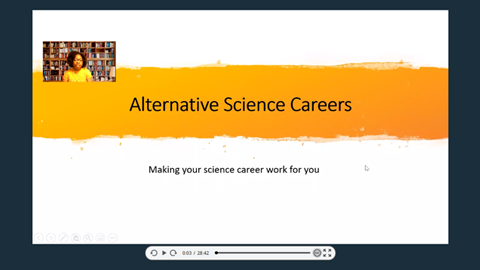7 tips for preparing for alternative science careers
For the recent ASBMB annual meeting, I gave a talk containing lessons I've learned from interviewing scientists in a variety of fields. Registered attendees can check out the talk on demand through May 31. For everyone else, I gathered seven tips from a few of the scientists featured in my columns.
1. Embrace your science journey.
Having a nonlinear pathway is common. Most of the scientists I've interviewed have said every experience helped them learn a new skill, find their strengths, and gain experience for their next role. Sometimes they volunteered or took a pay cut to gain experience. In my most recent column, I interviewed Efraín Rivera–Serrano, who shared how taking time to reflect on his science journey helped him see what he truly wanted.
Task: Do a reflection exercise.
2. Use the MyIDP.
There were a couple of sessions at the ASBMB annual meeting that talked about using the MyIDP tool, an assessment that helps you explore your values, skills and interests to find science careers that suit you. This is good for people on all science careers paths but especially for those who are exploring careers outside of industry and academia.
Task: Set your SMART (specific, measurable, attainable, relevant, and timely) goals.
3. Research before you pivot.
There are many ways to use your science to contribute to society. Explore your top areas from your MyIDP tool and dig deep. Do those areas fit you? Consider the transferable skills gained in different roles, such as project management, leadership and communication. This will help you target your search. When Ernesto Chanona realized his strengths involved the business side of science, public speaking and networking, he found the right position for him.
Task: Connect with others who share the same interests.

On-demand talk
Science careers are too often characterized as existing in only two sectors: academia or industry. In reality, people with scientific training are needed in a great variety of fields. In this presentation, ASBMB careers columnist Martina G. Eyefini shares what she has learned from interviewing dozens of scientists who now work in government, advocacy, outreach and inreach, nonprofit and legal roles. Tune in for help nailing down your values, skills and interests — and explore career paths that match, use and feed them. The video will be available on demand through May 31, 2021.
Watch the video.4. Learn to write in different ways.
Writing is a skill that is essential in all science careers. Can you distill your research into a few minutes or less than a page for multiple audiences? That is good way to start. In my interview with Nicholas Jury, he talked about how being persuasive in your writing is important, especially when it comes to writing policy memos. If you want to practice your policy writing, the Journal of Science Policy & Governance is hosting a few memo-writing sessions at the end of May.
Task: Learn a new form of writing.
5. Develop your own project.
Turn your research area or a cause you care about into a project you can share. Whether it is designing an app, creating a website or using your Twitter platform, projects make an impact. You never know who is watching. Beata Mierzwa used her passion of science and art to create Beata Science Art, which helped her grow her brand and get more commissions for her work.
Task: Share your work.
6. Get involved.
Whether you are interested in writing, policy, research or advocacy, the ASBMB has you covered. Looking to enhance your public speaking skills? Enroll in the Art of Science Communication course. Want to chime in on various topics live? Join the monthly Twitter chats. The next one is on Thursday, May 27, on #SciArt. If you want to stay up to date with science, check out ASBMB's recorded on-demand events.
Task: Find at least one resource or event to check out.
7. Find mentors and sponsors.
You put your work out there, and now it is time to find some people to connect with. Developing and maintaining relationships is essential when making a career pivot. Sometimes as you search people will start reaching out to you. Having an insider's perspective helps when you want to transition to a new field.
Task: Connect with at least one person.
Enjoy reading ASBMB Today?
Become a member to receive the print edition four times a year and the digital edition monthly.
Learn moreFeatured jobs
from the ASBMB career center
Get the latest from ASBMB Today
Enter your email address, and we’ll send you a weekly email with recent articles, interviews and more.
Latest in Careers
Careers highlights or most popular articles

Upcoming opportunities
ASBMB's PROLAB award helps graduate students and postdoctoral fellows spend up to six months in U.S. or Canadian labs.

From humble beginnings to unlocking lysosomal secrets
Monther Abu–Remaileh will receive the ASBMB’s 2026 Walter A. Shaw Young Investigator Award in Lipid Research at the ASBMB Annual Meeting, March 7-10 in Washington, D.C.

Chemistry meets biology to thwart parasites
Margaret Phillips will receive the Alice and C. C. Wang Award in Molecular Parasitology at the ASBMB Annual Meeting, March 7-10 in Washington, D.C.

Decoding how bacteria flip host’s molecular switches
Kim Orth will receive the Earl and Thressa Stadtman Distinguished Scientists Award at the ASBMB Annual Meeting, March 7–10, just outside of Washington, D.C.

Defining JNKs: Targets for drug discovery
Roger Davis will receive the Bert and Natalie Vallee Award in Biomedical Science at the ASBMB Annual Meeting, March 7–10, just outside of Washington, D.C.

Upcoming opportunities
No matter where you are in your career and what future path you aspire to, everyone needs leadership skills. Join ASBMB for practical strategies for building and practicing leadership skills.


